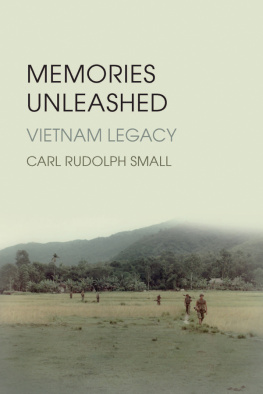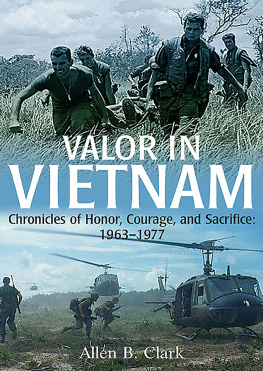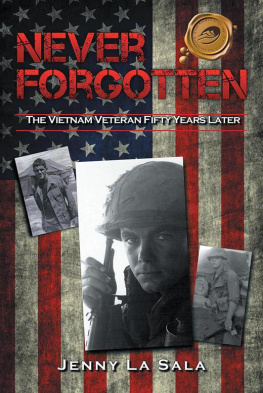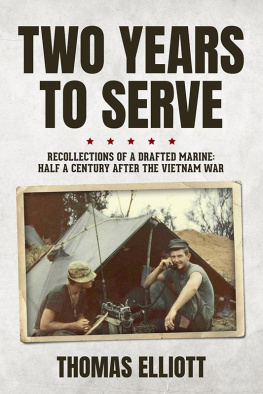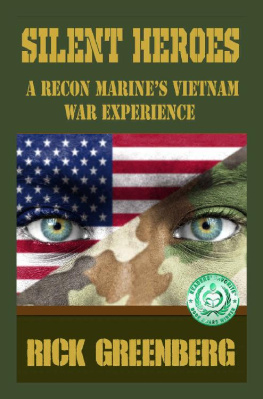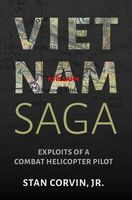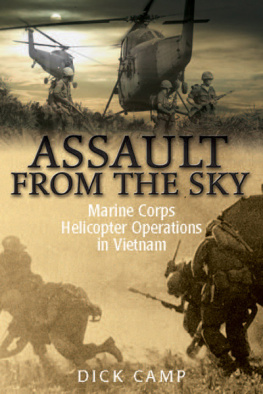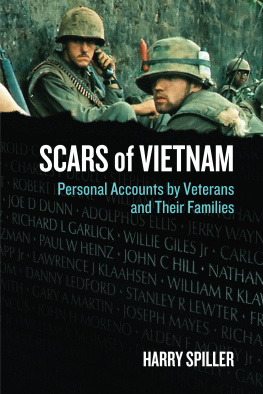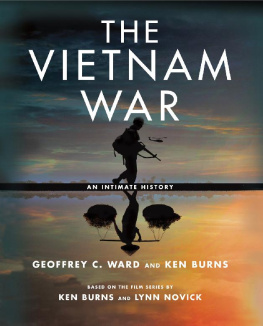Pagebreaks of the print version

MEMORIES UNLEASHED
Vietnam Legacy
CARL RUDOLPH SMALL

All rights reserved, including without limitation the right to reproduce this ebook or any portion thereof in any form or by any means, whether electronic or mechanical, now known or hereinafter invented, without the express written permission of the publisher.
Copyright 2019 by Carl R. Small
ISBN: 978-1-5040-5913-8
Casemate Publishing
1950 Lawrence Road
Havertown, PA 19083, USA
www.casematepublishing.com
This edition distributed in 2019 by Open Road Integrated Media, Inc.
180 Maiden Lane
New York, NY 10038
www.openroadmedia.com

Dedication
I dedicate this book to Barbara, my wife. I refer to her in this book as Her; or, my Love. We met on a blind date. She, sixteen, still in high school: me, eighteen, graduated; working on bridge construction. Her fathers words to her: No daughter of mine is going to date a construction worker. He worked construction; a crane operator. She won him over.
She stood by me when I was at war, half a world away, putting her life on hold; not even attending her high school prom. She wrote every day: EVERY day. Her letters would bring my thoughts away for a moment from the hell of war; back to a quiet, gentle place: a place of peace; and love: we were married January 23rd, 1971, four months after I came home from Vietnam.
Throughout our journey together in life, we have had joyous moments: we bought a house; a small four-room ranch; not four bedrooms; four rooms total. It had a white picket fence out front: like the one we talked about on our dates as we sat in the car, sipping root beer floats in a frosted mug at the A & W drive-in diner. We worked together making it our home; remodeling it late at night; after we each finished our day jobs. Our parents called it building sweat equity: it was really sweat and tears equity. Our daughter, our only child, was born sixteen years after we were married; a miracle baby; a blessing. But there were also trying times; scary times: Barbs first fight with cancer just a few years after we were married; winning it. Our daughter was eight when Barb fought cancer a second time: a different kind. As she fought it, she never slowed down being mom; wanting things to stay as normal as possible for our young daughter. She beat the cancer. Barb had her third fight with cancer about the time our first grandson was born, almost five years ago. During all the battles she fought with this enemy, she never mentioned the pain and discomfort; or fear: just saying to me this is temporary; we will get through it: her words; that of a warrior. During her fights, the chemo slowly infused into her body, and engaged the enemy; the battle for life raged: the cancers were defeated because of her unshakable Faith in God; modern medicine; her tenacity for life; and uncompromising spirit.
She has awakened me from nightmares that I never wanted her to know. She never asked about them; just lay quietly with me, her hand touching me softly until I went back to sleep or downstairs for a hot chocolate. Her strength is her gentleness; she was the person I thought about after the missions; sometimes during them; reminding me of the good in the world.
I thank God for her: and I thank her, with all my heart, for making me a better man with her love.
Every word; tied to a thought:
Every thought; tied to an emotion:
Every emotion; tied to an experience:
Every experience; tied to a life: Every life;
tied to another.
Introduction
I joined the Marine Corps in 1969, nineteen years old, nave, coming from Quechee, Vermont, a small farming community. After boot camp and specialty training, I landed in Da Nang, a PFC, assigned to 1/26/ Delta, a Marine Assault Force. I became part of a SLF (Special Landing Force). Our AO was I Corps; covering the area from the DMZ to below Da Nang; including the Islands and Marble Mountain. In late spring of 1970, that unit was pulled out of Vietnam. I was reassigned to 1/5/Alpha, another Marine Assault Force; AO still I Corps. Our work consisted of rapid response air-ground assaults to assist other assets that needed help. We were dropped in with choppers. Our missions ranged from company-or platoon-size search-and-destroy operations; to squad-sized day patrols and night actions (ambushes) and point element for mine sweepers. We were called upon for numerous security force actions such as for the Secretary of the Navy. We acted as first line of defense; positioned on the mountain pass surrounding Da Nang, for Bob Hope and other USO protections. Our unit worked with the ARVNs; the ROK (Republic of Korea) marines; the SOG (Special Operation Group); and Intel doing reconnaissance on enemy vills. We did pacification missions; working with CAP units to secure friendly vills from enemy forces. In the course of my thirteen-month tour of duty I rose up in rank to sergeant; youth and innocence lost.
The memories of Vietnam in this book are intertwined; some good; some bad. Some would wake me up at night as dreams, or nightmares. I started putting them down on little scraps of paper. I wasnt sure then, why, but felt drawn to doing it.
Four years after I came back from Vietnam, I was visiting my parents. During the course of the conversation, we went to look up some paperwork. I helped them sort through things. We came across old pictures and letters from Austria. My mother was Austrian. My dad had met there during World War II. Her and her family knew first-hand the cost of war. Her father and brother had been killed by the Nazis. Her family learned to hide by day and move at night. She toasted bread so it would last longer in her survival bag, living hand to mouth as they struggled to stay ahead of the Nazis. After the war, she married my dad and he brought her to America. She became a U.S. citizen. She always carried food in her purse. We thought it was to appease us; six hungry children; not knowing until years later of her fight for life in war.
I opened another drawer. A cardboard box, about the size a necklace would come in, fell to the floor. I picked it up and started to give it to my mother. She said it was dads and opened it. It was a medal he was awarded from World War II. We knew he had fought in France and Germany and Austria. He had never talked about the war. I asked him why he had never said anything. His reply: The same reason you dont talk about Vietnam. He closed the box and put it back in the drawer.
That moment became a memory. It is said that memories are pictures that the heart takes. I have used those words on occasion: at times when loved ones have moved away; or at funerals, hoping to console the bereaved left to deal with their shattered world. I believe those words to be true.
Forty-two years later, I had not spoken of this war, but had thought a lot about that day when I learned that such an important part of my fathers legacy had not been known to us. Over the years after the war, I felt I never wanted my family to know what I had experienced. Realization came to me that I didnt want my family, or others, to miss that fragment of their history.
The Vietnam War became one of the most divisive wars in U.S. history. Subversive anti-U.S. government groups sprang up, unrest at colleges and universities turned from peaceful demonstrations to ugly, uncontrolled destruction and death.

